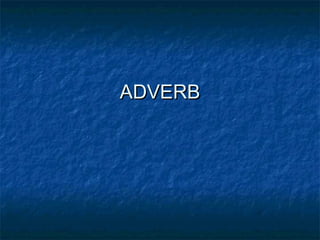
sattumogo Adverb
- 1. ADVERBADVERB
- 2. Adverb modifies verb, adjective and otherAdverb modifies verb, adjective and other adverbs.adverbs. It also modifies a sentenceIt also modifies a sentence Ex: Usually, I drink milk.Ex: Usually, I drink milk. Adverb do not modifies any noun orAdverb do not modifies any noun or pronoun.pronoun.
- 3. Adverb is classified into three kinds:Adverb is classified into three kinds: Simple AdverbSimple Adverb Interrogative AdverbInterrogative Adverb Relative or Conjunctive AdverbRelative or Conjunctive Adverb
- 4. Simple Adverb: It modifies any word or sentence.Simple Adverb: It modifies any word or sentence. It has seven kinds:It has seven kinds: 1. Adverb of Time:1. Adverb of Time: Today, tomorrow, yesterday, daily, a1way,Today, tomorrow, yesterday, daily, a1way, now, then, ago, often etc.now, then, ago, often etc. 2.Adverb of Place: Here, there, everywhere, anywhere, no where,2.Adverb of Place: Here, there, everywhere, anywhere, no where, up, down, below, outside. inside, far, near, neither, thither, in, out,up, down, below, outside. inside, far, near, neither, thither, in, out, above, below etc.above, below etc. 3.Adverb of Manner: Badly, wisely, quickly, highly, silently. certainly,3.Adverb of Manner: Badly, wisely, quickly, highly, silently. certainly, slowly, justly. probably, gently, hardly, well, so, thus, how etc.slowly, justly. probably, gently, hardly, well, so, thus, how etc. 4. Adverb of Degree4. Adverb of Degree :Very, much, hail, so, extremely, too, quite,:Very, much, hail, so, extremely, too, quite, how, twice, almost, fully, wholly etc.how, twice, almost, fully, wholly etc.
- 5. 5.Adverb of Number: Once, twice,5.Adverb of Number: Once, twice, secondly, thirdly, often, always, never,secondly, thirdly, often, always, never, sometimes, again, seldom etc.sometimes, again, seldom etc. 6.Adverb of Order :First, second, third,6.Adverb of Order :First, second, third, last, lastly, firstly, secondly, thirdly etc.last, lastly, firstly, secondly, thirdly etc. 7.Adverb of Cause and Effect: why,7.Adverb of Cause and Effect: why, therefore, wherefore, hence, accordingly,therefore, wherefore, hence, accordingly, consequently, as, yet, because, so etc.consequently, as, yet, because, so etc.
- 6. Interrogative Adverb : It is used to ask questionsInterrogative Adverb : It is used to ask questions .Ex: Why, when, where, how, how many. how.Ex: Why, when, where, how, how many. how much etc.much etc. It has the following categories:It has the following categories: Time : When will you go there?Time : When will you go there? Place : Where does he live?Place : Where does he live? Number : How often does the bell ring?Number : How often does the bell ring? Condition : How do you feel today?Condition : How do you feel today? Cause : Why has he done the work?Cause : Why has he done the work? Quantity : How much rice do you need?Quantity : How much rice do you need?
- 7. Relative adverb :It joins two sentences.Relative adverb :It joins two sentences. Ex :I Know the place where he lives.Ex :I Know the place where he lives. Can you tell me the time when he willCan you tell me the time when he will come?come? Conjunctive adverb: If there is noConjunctive adverb: If there is no antecedent before an adverb it is calledantecedent before an adverb it is called Conjunctive adverb.Conjunctive adverb. Ex: I know where he lives.Ex: I know where he lives. Can you tell me when he will come?Can you tell me when he will come?
- 8. Adverbs has some more forms:Adverbs has some more forms: Prepositional Adverbs: A-way (on way), a-Prepositional Adverbs: A-way (on way), a- sleep, in-deed, a-newsleep, in-deed, a-new Genitive Adverb :once (of one time), twice (ofGenitive Adverb :once (of one time), twice (of two times), always, (of all ways),two times), always, (of all ways), Introductory Adverb: There lived a king. Here isIntroductory Adverb: There lived a king. Here is your penyour pen ““The” as an adverb :The more, the merrier, TheThe” as an adverb :The more, the merrier, The sooner, the better.sooner, the better. Compound Adverb :Sometimes (some+ times),Compound Adverb :Sometimes (some+ times), beside (by + side ).beside (by + side ).
- 9. THANK YOUTHANK YOU
- 10. THANK YOUTHANK YOU